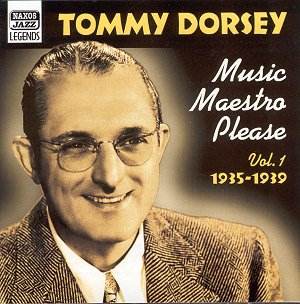Tommy DORSEY (1905-1956)
Music Maestro Please
Original recordings: Volume 1: 1935-1939
 NAXOS JAZZ LEGENDS 8.120580 [62.50]
NAXOS JAZZ LEGENDS 8.120580 [62.50]
Crotchet superbudget |
 |
Stomp it off
Weary Blues
Jamboree
Maple Leaf Rag
Chinatown, my Chinatown
For sentimental reasons
Little white lies
Tears in my heart
The milkman’s matinee
Royal Garden Blues
Night glow
Music Maestro please
The Sheik of Araby
Black eyes
Everybody’s doin’ it
Night and day
Washboard Blues
Nola
Boogie Woogie
Night in Sudan
Twenty tracks, many of familiar numbers, from one of
the finest jazz trombonists of all time with his own orchestra or with
his Clambake Seven, recorded either in Hollywood or New York during
the four years leading to the Second World War, and remastered (very
well too) by Peter Dempsey.
Dorsey was the leader of one of the greatest of the
Big Bands of the Swing Era. He was the brother of Jimmy Dorsey but a
famous split between them took place in 1935 during a Glen Island Casino
gig and each in his own right then led a successful outfit.. Tommy became
known as the Sentimental Gentleman of Swing and employed the exalted
likes of Bunny Berrigan, Bud Freeman, and Buddy Rich. By 1937 he had
his first million seller with ‘Marie’ (an Irving Berlin number) and
he and Benny Goodman were amicable rivals (between the dates of this
CD Goodman’s fifty top ten hits had nine at No.1 and five at No.2, whereas
Dorsey, in the same period, had sixty top ten hits, of which thirteen
were at No.1 and four at No.2). It would take Glenn Miller to overshadow
Tommy Dorsey. The Dorsey brothers, incidentally, were eventually reconciled
from 1947 until Tommy’s death on 26 November 1956.
Most of the tracks are self-evidently great hits. These
are the most popular numbers of the day from the Cole Porter ‘Night
and Day’ to Scott Joplin’s ‘Maple Leaf Rag’, while the creamy voice
of Edyth Wright features in the vocals of ‘Jamboree’, ‘Everybody’s doin’
it’, not the Turkey Trot but the Ragtime, ‘Tears in my heart’ and ‘The
milkman’s matinee’. Apart from the smooth sophistication of Dorsey’s
trombone playing, which I have admired for years, it’s the sheer homogeneity
of the instrumental choruses within his ensemble which are so striking.
This extends even to the rather cheeky out-of-tuneness of the clarinets
Johnny Mintz and Mike Doty in ‘Nola’, followed by the impeccably focused
trumpets led by Pee Wee Erwin and the witty piano playing of Howard
Smith, all of them long-term Dorsey players. The best track of the lot
(from the point of view of the playing rather than the transfer quality)
is the cheerful, foot-tapping ‘Boogie Woogie’ from September 1938. Tommy
Dorsey has the last word.
Christopher Fifield